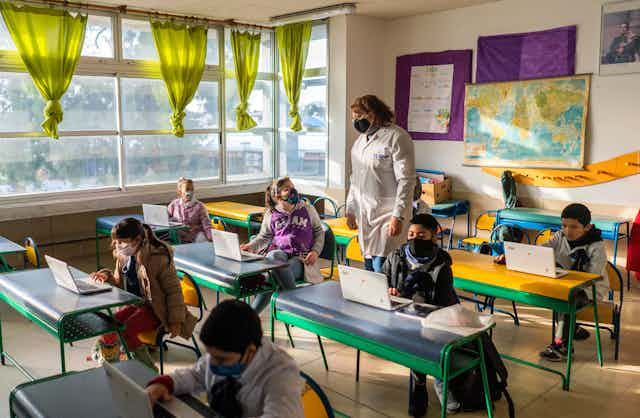Essential Requirements to Take Into Consideration When Assessing Prospective Schools for Enrollment
When thinking about colleges for registration, assessing crucial requirements becomes vital to making certain a conducive understanding setting. Secret variables such as the placement of academic programs with students' ambitions, the certifications of professors members, and the impact of course sizes on personalized interest are important. Moreover, the presence of durable sources and facilities, together with a varied series of after-school activities, can significantly enhance instructional experiences. Moreover, the institution's society ought to promote respect and inclusivity to foster an encouraging area. Each of these facets plays an essential duty, but how do they adjoin to form the perfect instructional setup?
Academic Programs
When reviewing possible schools for registration, thinking about the breadth and deepness of their scholastic programs is paramount. High-quality academic programs not just identify the instructional value a trainee will obtain but likewise influence future possibilities and profession courses. Possible students and their family members should look at the educational program to guarantee it aligns with the pupil's academic rate of interests and occupation goals.
Certification is a critical aspect, as it represents that the institution satisfies established requirements of top quality. Furthermore, the diversity certainly offerings, including advanced positioning (AP) or Global Baccalaureate (IB) programs, can significantly enhance a student's knowing experience. Institutions with robust scholastic tracks in STEM, liberal arts, and the arts suggest a dedication to detailed education.
Professors qualifications and student-to-teacher ratios are likewise essential indicators of academic excellence (Save Temecula Schools). Extremely credentialed instructors and smaller sized class dimensions frequently cause even more personalized attention and a better academic experience. The schedule of scholastic sources such as collections, labs, and innovation centers can even more enrich the understanding environment.
Evaluating these components ensures that the picked college supplies a encouraging and rigorous scholastic structure, essential for fostering intellectual growth and preparing trainees for future success.
After-school Activities
Beyond the scholastic realm, after-school activities play a considerable duty fit an all-around educational experience. These tasks offer pupils with opportunities to create skills that prolong beyond the class, such as leadership, time, and synergy administration. When evaluating prospective schools for registration, it is vital to take into consideration the variety and quality of extracurricular programs used.
A varied series of activities, consisting of sporting activities, arts, songs, argument clubs, and social work campaigns, can deal with various interests and talents. Institutions that support a wide range of extracurriculars demonstrate a dedication to promoting holistic development. In addition, participation in these tasks can boost university applications and returns to, showcasing a trainee's ability to balance multiple duties.
Additionally, take into consideration the level of trainee engagement and the college's support of engagement. Institutions that actively promote extracurricular participation commonly create a lively, inclusive neighborhood.
Course Sizes
One of the vital factors to take into consideration when examining possible colleges for registration is class size. Class size considerably influences the quality of education that a pupil receives.
Moreover, smaller sized course sizes can add to an extra natural class atmosphere. With Recommended Site less trainees, there is a higher chance for constructing strong partnerships between teachers and peers, which can improve the knowing environment and promote a feeling of area. This also permits even more efficient classroom monitoring, as teachers can dedicate more time to preserving a efficient and favorable environment.

School Culture
When reviewing potential institutions for registration,Comprehending the importance of school culture is vital. School society encompasses the values, ideas, and habits that shape the social and finding out atmosphere. A comprehensive and encouraging society fosters trainee interaction, academic success, and individual growth. Analyzing a school's society includes observing communications amongst pupils, instructors, and team, along with understanding the college's objective, values, and expectations.
Prospective moms and dads and pupils need to look for institutions that focus on respect, collaboration, and a favorable ethos. Look for signs page such as solid student-teacher relationships, active involvement in institution activities, and a feeling of neighborhood. A healthy school culture commonly advertises variety and inclusion, guaranteeing that trainees from different backgrounds really feel invited and valued.
Furthermore, a favorable college culture motivates open communication and provides trainees with a safe atmosphere to reveal themselves. It likewise supports academic rigor while balancing after-school activities that add to holistic growth. When seeing a school, engage with existing students and personnel to evaluate their satisfaction and sense of belonging. Inevitably, the best school culture will line up with a family members's worths and add significantly to the total educational experience.
Facilities and Resources
When evaluating possible schools for registration, the quality and accessibility of resources and facilities play an essential duty in forming the educational experience. An institution equipped with modern services can considerably improve learning results.
Libraries are one more cornerstone of scholastic excellence. A well-stocked collection with a varied series of publications, journals, and electronic resources can support pupils' research requirements and cultivate a society of analysis and inquiry. Just as important are athletic centers. Health clubs, sports fields, and swimming pools not just add to physical well-being however also promote synergy and technique.
Modern technology is important in today's academic landscape. Institutions should supply trusted web gain access to, computer labs, and wise classrooms to facilitate digital understanding. Additionally, specialized resources such as art studios, music spaces, and theater rooms can support innovative skills.
Eventually, the breadth and quality of a college's facilities and sources can greatly influence look at this now a student's total growth. Thus, parents should meticulously analyze these facets to make certain an all-round and enriching instructional experience.
Conclusion
In summary, reviewing prospective colleges for enrollment necessitates a thorough analysis of numerous crucial variables. Furthermore, a school culture that stresses respect and inclusivity is necessary to creating a reliable and supportive knowing setting.

A healthy and balanced school culture usually advertises diversity and addition, ensuring that pupils from diverse backgrounds really feel invited and valued.
In addition, a positive institution society encourages open communication and gives trainees with a safe atmosphere to share themselves.